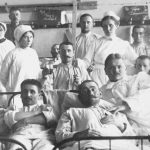 The Intellectual History in East Central Europe Research Network (Web)
The Intellectual History in East Central Europe Research Network (Web)
Time: 17.04.2021
Venue: virtual space, via Budapst/Vienna and Prague
Proposals – extended – by: 24.03.2021
The outbreak of the Covid-19 pandemic prompted a quest for historical parallels that help us contextualize this traumatic event. The voices of historians, sociologists, and philosophers of science are vital in this debate. This event uses the case of interwar East Central Europe to explore these historical parallels. After the collapse of continental empires, this “other Europe” faced a double challenge of taming epidemics and creating new states. Drawing on the concept of biopolitics, this panel will rethink the process of nation-building through the prism of epidemics control. What social actors claimed expertise on these issues, and how did they win – or fail to win – trust in polarized interwar societies? How did their discourses and practices relate to the ethnocultural diversity of these spaces and how did they shape identities such as race, gender, class and ability? On what transnational, (post-)imperial, and colonial models did they draw? Conversely, how did the biopolitical experts, knowledge and practices from East Central Europe circulate on a global scale?
Program (Poster as PDF)
- 11:00: Panel of distinguished speakers (4 panelists + 1 chair)
- 13:00: Lunch and coffee break
- 15:00: Seminar with graduate students, based on the panel and pre-assigned readings (moderated discussion)
About the Network
“Intellectual History in East Central Europe” was launched in 2020 by a group of advanced doctoral students from the Central European University. The aim of the research network is to promote – in the ECE area – the research on intellectual history that goesbeyond the national canons. More information (Link).
Application
This panel will bring together distinguished scholars from various contexts to examine these issues. Each panelist will give a short talk (cca. 20 min), which will be followed by a Q&A session, moderated by the chair. Moreover, the panel will be followed by a seminar that provides a platform for selected emerging scholars to critically reflect on state-of-the-art scholarship.
In order to apply to participate in the seminar, please send the organizers a motivation letter (max. 500 words), as well as your CV. Both of these documents should be submitted to the e-mail address intellectualhistoryece@gmail.com by – new – March 24st. The organizers will get back to you about the decision on your participation by March 31th the latest (PDF).
This is an online event, which will take place on Zoom. Please note that the event will be recorded and the recording posted on the network’s website for everyone to see.
Contact information: Should you have any questions regarding the logistics or the content of this event, please don’t hesitate to reach out to us using the e-mail address: intellectualhistoryece@gmail.com
